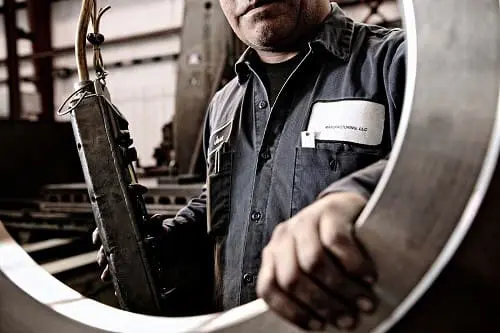
At one time in America, a high school graduate could make a pretty good living after receiving a diploma. Getting a job at a large manufacturing plant operating a lathe or other machinery meant decades of employment, steady raises and a ticket to a comfortable middle-class lifestyle.
Not anymore.
Multinational companies sent a lot of manufacturing jobs overseas in recent decades, where labor and overhead were cheaper. While there is now an ongoing movement to bring many of these jobs back, the requirements to gain one of these well-paying blue-collar factory positions have changed. A high school diploma is no longer enough. Today, an increasing number of manufacturers are requiring post-secondary training – such as at a trade school – or even a college degree. Today, a high school diploma may only get an applicant a job sweeping the factory floor.
Last year, the New York Times reported on German engineering giant Siemens opening a huge gas turbine manufacturing plant in Charlotte, NC. Some 10,000 people showed up at a local job fair hoping to be hired for one of 800 open positions at the new facility. However, the Times reported that only 15 percent of applicants could pass Siemens’ pre-employment aptitude screening consisting of a reading, writing and math test.
As one company official told the Times, “In our factories, there’s a computer every 20 to 30 feet. People on the plant floor need to be much more skilled than they were in the past. There are no jobs for high school graduates at Siemens today.”
Earlier this year, three researchers analyzed hundreds of thousands of manufacturing company job postings. Not surprisingly, they found the knowledge and skill requirements have risen substantially. They write:
“… we observed that manufacturers need multi-functional engineering technicians possessing both traditional manufacturing and engineering skills. The result is that today’s high-value production worker is a hybrid of a boots-on-the-ground technician and an engineer laser-focused on improving how things get done.”
Consulting giant Deloitte estimates the U.S. economy could add up to 3.5 million manufacturing jobs by 2025. More than three-quarters of employers in manufacturing are willing to pay above market rates to find qualified workers. However, a stunning 2 million of these future jobs may go unfilled due to a growing skills gap. This is not just a problem for manufacturing companies, but for our economy as well. Deloitte notes that for every job created in the manufacturing sector, 2.5 new jobs are created elsewhere as a result. And for every $1 invested in domestic manufacturing, $1.4 in additional value is created in other economic sectors.
So, if a high school diploma is no longer enough to even get a foot in the door even as manufacturers are begging for workers, what does one need to do to get a job on the factory floor?
Many colleges and universities are reacting to this growing shortage and skills gap by adding manufacturing and factory training programs at campuses across the country. These new programs feature the same machinery and computer software used at manufacturing facilities. And while employers are increasingly requiring post-secondary education, high schools are also retooling their programs, focusing more on career and technical skills. This isn’t just bringing back wood or metal shop. Many school districts are opening specialized high schools for students wanting manufacturing jobs.
While manufacturing companies were once quick to criticize applicants for not having the required skills and complain about education, they’ve also realized that if they want competent, highly trained workers, they’re going to have to pitch in themselves. Companies are now partnering with schools and local governments to develop a new generation of skilled workers.
The factory floor has changed forever. Manufacturing jobs are no longer a good fit for high school graduates whose only qualification is a willingness to get his or her hands dirty running a machine for a living. Those days are gone. Manufacturing today demands tech-savvy problem solvers who work with computers and their minds as much as their hands.
- What Is An Invoice Factoring Broker? - July 17, 2022
- 7 Tips for Buying Out a Business Partner or Majority Owner - May 13, 2022
- 6 Leadership Secrets Every Small Business Owner Should Know - December 9, 2021

